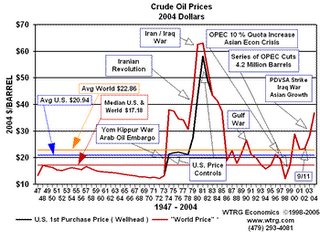
Iran’s quest for nuclear technology took another turn today. Actually, some would argue that these latest rounds of threats were pre-meditated. On December 12, Iran – OPEC’s 2nd largest producer requested to cut its output ceiling in the first quarter of 2006, the Islamic republic's OPEC representative has said. AFP On December 28, Oil Minister Kazem Vaziri-Hamaneh told the Shargh newspaper that he wanted to see the grouping decide on a quota cut of one million barrels per day (bpd) at the meeting.
Today, Iranian President Mahmoud Ahmadinejad cautioned that any sanctions over its disputed nuclear program could cause an unexpected hike in oil prices. Both the EU and the United States are pushing for Iran to be referred to the Security Council over what they fear is a covert weapons drive, leaving Tehran exposed to the threat of eventual sanctions. Economy Minister Davoud Danesh-Jaafari said "any sanctions in the current situation would be more detrimental for the West than for Iran.
"They confront us and deal with us in a very harsh and illegal language, but ultimately they need us more than we need them," Ahmadinejad said at only his second news conference since his election. Iranian Economy Minister Davoud Danesh-Jafari said any sanctions to punish Iran could hurt the sponsors. "Any possible sanctions on Iran ... could possibly, by disturbing Iran's political and economic situation, raise oil prices beyond levels the West expects," he told state radio. Iran is the world's fourth largest exporter of crude oil.
On Jan 12, 2006 Ahmadinejad said that the Islamic Republic’s 1979 revolution was a great movement and a stepping stone to a final "great event" in the world. Ahmadinejad added "Islamic Republic is the continuation of the path of the prophets which came to begin a great movement and the final occurrence".
Looking back to the crude oil prices during the Republic’s 1979 revolution it is easy to see that there may be something behind these threats. Events in Iran and Iraq led to a round of crude oil price increases in 1979 and 1980. The Iranian revolution resulted in the loss of 2 to 2.5 million barrels of oil per day between November, 1978 and June 1979. At one point production almost halted.
Iraq invaded Iran in September 1980 by November the combined production of both countries was only a million barrels per day and 6.5 million barrels per day less than a year before. Worldwide crude oil production was 10 percent lower than in 1979. The combination of the Iranian revolution and the Iraq/Iran War resulted in crude oil prices more than doubling from $14 in 1978 to $35 per barrel in 1981. Twenty-five years later Iran's production is only two-thirds of the level reached under the government of Reza Pahlavi the former Shah of Iran.
[Iran Islam]
No comments:
Post a Comment